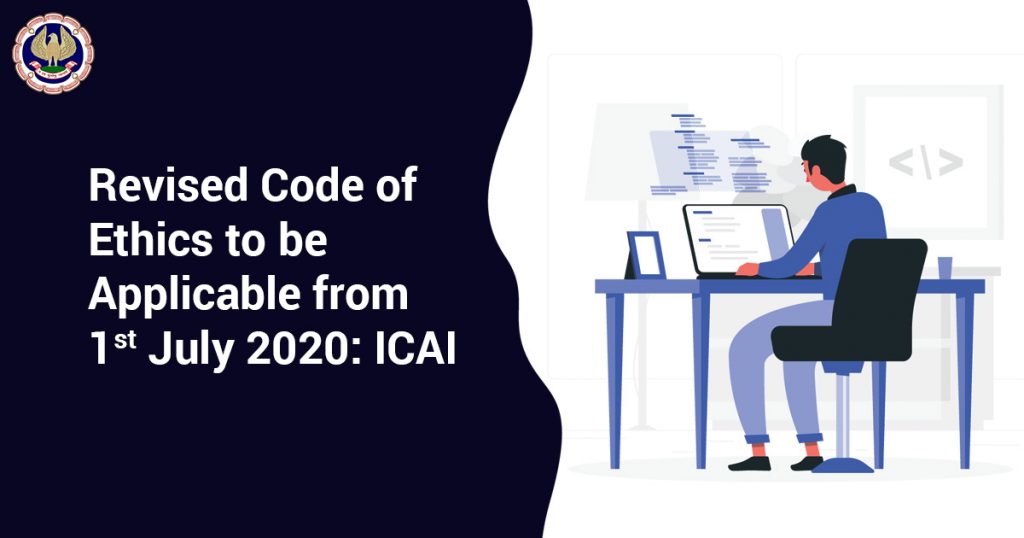The Institue of Chartered Accountants of India (ICAI) has issued a revised 12th edition of the Code of Ethics for the Chartered Accountants of India. The revised Code of Ethics will be applicable from 1st July 2020. The code was revised during the 393rd meeting of the institute. The code has been revised based on the 2018 edition of the Code of Ethics of the International Ethics Standards Board for Accountants (IESBA).
The present Independence sections (290 and 291) have been converted into Independence Standards (Parts 4A and 4B) under the revised code. Each section is restructured under the revised code. The parts revised have listed the specific and general obligations of the members.
The “Application” part of the revised code includes context, explanations, suggestions or actions, illustrations, and other guidance to be compiled by the members of the institute.
Some dedicated provisions for all Chartered Accountants in specific circumstances have also been provided in the code. Such provisions will be applicable and helpful for accountants while dealing with ethics and independence issues.
The code states that if such provisions can not be followed by the accountant in any case, then he should drop such activity immediately. The accountant must make sure that if he/she continues the work on such an activity then his/her efforts must be to ensure that the threats of the activity are removed or at least reduced to an acceptable level.
The revised Code of Ethics has been issued according to the conditions prevailing in the country and does not contradict Indian domestic laws. The provisions of the code have been created according to the provisions of the Companies Act 2013. Although the code is revised, the ethical principles are not different from the previous one. It has been created with a fresh and better approach, containing revised provisions.
READ ALSO : ICAI to open Representative Offices in Jurisdiction where ICAI overseas Chapters cannot form
Some of the new provisions added in the code are:
- Some additional terms like Public Interest Entity (according to the provisions of the independence part including Non-assurance services to an Audit client, Long Association of personnel, Employment with an audit client), Key Audit Partner (according to the provisions of partner rotations) and Companies Act’s definition of “Relatives” have been introduced in the revised code as a response to the Non-Compliance of Laws and Regulations (NOCLAR).
- Services of the Chartered Accountants playing a crucial role in the financial reporting supply chain and facilitating effective governance in organizations have been included under the sections of the new code.
- The revised code includes a detailed description of inducements and results of bribery and corruption among the members.
- The independence provisions have been strengthened under the new code including that related to a long association of the members and accountants with the audit clients (including partner rotations).
- A tougher framework while dealing with a breach of one or more provisions of the Code of Ethics.
- A section named “Management Responsibilities” have been included in the code which contains the activities to be and not to be considered and covered by the management of the firm along with some enhanced guidelines.
- The new code includes provisions to restrict the audit team and/or the key audit partners from getting any form of compensation from the audit clients for providing non-assurance services
- Guidelines to address the conditions in case of a merger or acquisition, the entity becomes a related entity of an audit client have also been included under the revised code. The guidelines will guide the CA to evaluate the interest and relationships, whether previous or current, under such cases.
- Provisions related to some threats that may be created by some of the taxation services have also been introduced under the new code.
- The revised code has introduced some provisions for requirements in the cases where the total gross annual professional fees from the audit clients or any of its related parties, exceeds 15% of the total fees received from the firm in two consecutive years.
- The revised code includes detailed provisions of independence requirements for assurance.
- The code details the provisions for auditor rotation according to the regulations.
Most of the provisions introduced and the changes made in the code are issued in response to the Non-Compliance of Laws and Regulations (NOCLAR). According to the new code, while providing professional service to the client or the employer, the members may face some unethical activities as listed under the NOCLAR.
Such activities may be committed by the client or the employer or the management, governance or employees of the firm. Recognising these can be very hard and tiring for the members but he/she should not ignore such activity under any case and should deal with the situation according to the provisions of IESBA (International Ethics Standards Board for Accountants). The provisions of IESBA will help the accountant in dealing with the situation and will provide ways through which the accountant can ensure the best interest of the general public.
Due to the outbreak of Covid-19, the following provisions of the Volume-I of Code of Ethics, 2020 have been postponed until further notice:
- Responding to Non-Compliance of Laws and Regulations (NOCLAR) [Sections 260 and 360]
- Fees – Relative Size [Paragraphs 410.3 to R410.6]
- Taxation Services to Audit Clients [Subsection 604]
The rest of the provisions as introduced and as edited under the revised Code of Ethics will apply to all the professionals from 1st July 2020.
